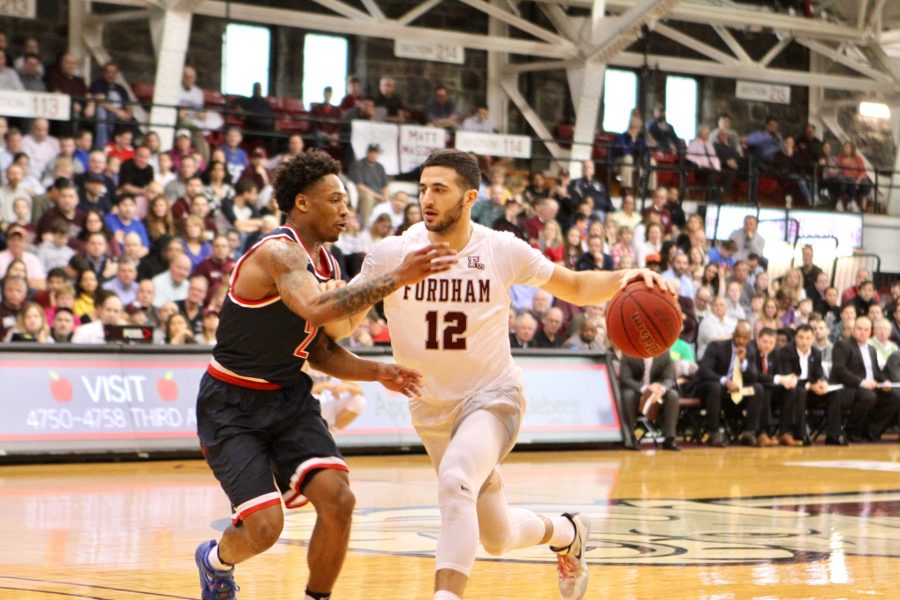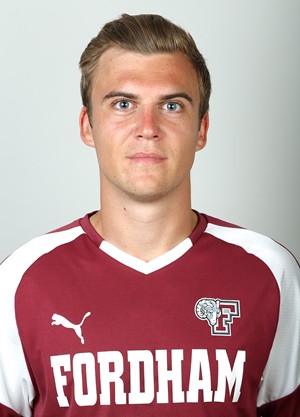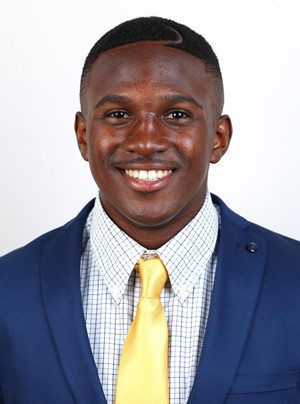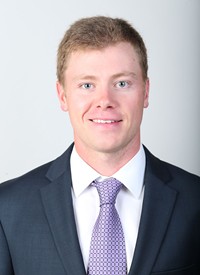By Alvin Halimwidjaya

With Fordham Men’s Soccer searching for their third Atlantic 10 championship in four years, The Fordham Ram sat down with senior defender Matthew Lewis. A leader of the Rams’ backline, Lewis is on Fordham’s top-10 list in career starts and is a key member of this team, scoring the game-deciding penalty kick against VCU in last year’s A-10 championship.
TFR: When did you first start playing soccer?
ML: I first started playing, probably as early as I can remember. Five years old, my parents probably put me in. I always played up a couple ages too; I remember when I first started playing, I started playing a U-6 team. I think I was about four years old, or something like that.
TFR: Did you go to training camps or academies?
ML: Well, my dad coached me for the first couple of years. Obviously, I don’t remember too much about that, but then I was on a travel team with one of my buddies. We played in Kansas. I was in Missouri, so the fields were about 45 minutes away, and we would just have games every Saturday-Sunday. My buddy’s dad was the coach. He was a pretty good soccer coach, and then it was just kind of like: soccer, soccer, soccer.
TFR: You were on both your high school’s basketball and soccer teams. Had you already decided that you were going to pursue soccer, or did both those experiences impact your decision?
ML: So when I went to high school, I was planning on playing basketball, soccer and baseball in the spring. Going into high school, actually, I was a big baseball player, but then I got an injury my elbow, and after I got the injury, I just kind of focused on soccer, and that was around the time I was brought into the Sporting KC [Kansas City] Academy. I had some ups and downs with them; I got put on the reserve team, and then I had to step away, and then I came back next year, tried out again and made the team. Then, once you make the team, you kind of have to play only one sport, so freshmen and sophomore year I played basketball and soccer, then junior year I could only play soccer through the academy systems.
TFR: Can you talk about your experience playing for Sporting KC in the USSDA, and how it influenced your growth as a player?
ML: I’m a big proponent of the development academy. I think it’s super important for young players because, first of all, training with the same team for ten months out of a season is very important for yourself, because you don’t have to constantly be learning new players. The quality is also high; being from a professional club, it was very helpful because it was in direct association with the first team, so I would get called to train with the reserves or the first team, and that was pretty cool. Those are good experiences to have when you’re 16 years old, and it just really helped me mentally, knowing where I have to be, what level I have to be at if I want to play professionally.
TFR: Why did you choose Fordham?
ML: When people ask me this, I always say that Fordham chose me, because I didn’t actively look at Fordham. I was at a showcase in Florida, and the coaches here saw me. At the end of the decision-making process, it came down to Fordham and Denver. My grandparents had a big part in the decision, with my grandfather being a deacon, and I went to a Jesuit high school, so a couple of things just worked together. They also had a better package for me, so I zoned in on Fordham.
TFR: Since you came to Fordham in 2014, you guys have won two A-10 championships in three years. What has it been like to be part of building a winning culture for the Rams?
ML: It’s pretty cool, because obviously, when I came in it was semi-tough, but we had 13 guys come in my recruiting class, and I think our class, in general, just brought in a new, winning mentality. It’s been awesome, obviously, winning two A-10 championships, but it’s tough [to pin it on] our class necessarily, because we still had three grades above us in freshman year, but it’s definitely cool to come in and make an actual difference and seeing actual results. Not just a winning record, for instance; we’re getting rings, and it’s pretty cool.
TFR: You broke into the top-10 list for career starts against Manhattan. How have you been able to maintain both your health and level of play to consistently stay on the field?
ML: So coming in freshman year, I was really just focused on getting on the field, and then after I earned my spot, it was just keeping the level of play high so I could keep my spot. I’ve had my fair share of injuries; fortunately for me, they mostly come in the springtime, but I’ve also had a couple of injuries in the fall, and it’s just deciphering what’s injury and what’s pain. It’s also getting in the training room, because our trainer is great. She works with me quite a bit, especially this season. I’ve been there in the morning, an hour before training, just getting some treatment because I’ve been battling some stuff this season as well. It’s just a matter of playing through things, because you really don’t have that much time. It’s really about just two months of your time where you have to put everything you got into it. You don’t really want to miss anything; I certainly don’t, so that’s my mentality going into it.
TFR: What do you think is the strongest part of your game? What is one area that you’re trying to improve in?
ML: So one of my weaknesses, I feel like, is just being able to be a vocal leader throughout the entire game. That’s a role I walked into, and I think it’s important for me to focus on throughout the entire 90 minutes. I’ve gotten better at it as the four years have gone by, but just keeping everybody focused, keeping everybody on track is important. That’s one of the roles I have, and it’s a vital one. One of the areas I feel I’m good at is technically just trying to play as simple as I can, not trying to overcomplicate things. I understand whatever we go over in the classroom during pregame, or a scouting report. I pay attention to those well, so I have a sense of what the other team is going to bring at us.
TFR: How does having a first-rate goalkeeper like Rashid Nuhu help you as a defender?
ML: It gives us confidence and comfort. He’s great with both his feet and his hands, so we can play through him if we have the ball, and if we’re defending, we know we have him as our comfort shield or security blanket. That lets us play our game a little more, not having to worry about guys taking shots from 25, 30 yards out and allows us to stay back a little more.
TFR: What can people usually find you doing off the field? What do you like to do in your spare time?
ML: I like to play Xbox… I love watching any sport, whether it’s the Champions League or football, I’m a big fantasy guy. For most of my free time, I probably spend it either playing Xbox or just hangin out, I don’t really have any specific hobbies.
TFR: What are your plans after you graduate?
ML: So I’m graduating in December, and I want to play professionally. I’m considered a homegrown player, so I could get picked up without going through the draft; it’s a lot of unknowns right now, but I’m definitely going to chase it, at least for a year or two. If nothing opens up right away, I think I’m going to try and get some trials after that and really just put myself out there. I think I would be selling myself short if I didn’t. I have couple of Plan B’s and C’s if that doesn’t work out.
TFR: Are you considering playing overseas at all?
ML: Overseas is a tough one, because you kind of have to get invited. If you go voluntarily, you’re not going to get to the top [leagues]. MLS is always tough; even guys who get drafted end up in the second league, which is an option for me. I have a couple of contacts I can go to for that level, and obviously, if I make it onto an MLS team, it’s just about proving myself. Once I prove myself at that level, I would obviously love to go overseas, but I also don’t want to discount the US. Atlanta just bought a new stadium, and they just sold out around 70,000 seats for an American soccer game as an expansion team. It’s really growing in the US, so it’s not something to discount.
TFR: As a senior, what advice would you have for the freshmen just coming into the program?
ML: For the freshmen, it’s tough. Freshman year is one of those times where you have to come in and prove yourself, and not everybody breaks through that first year. For those guys, it’s really just sticking with it. There are obviously freshmen that have gotten a lot of minutes, started almost every game, but for the guys who haven’t, it’s more important to stay with it and you’ll get your looks. Just keep working hard in training and don’t give up on yourself.
TFR: You converted the game-deciding penalty kick against VCU in last year’s A-10 Championship game. Is that a moment you still remember?
ML: Yeah, it is. It’s funny too, because that wasn’t a great PK, but I obviously think back about that. I don’t think it’ll leave me anytime soon, because those kinds of moments are so exciting, and just sharing it with a bunch of guys you’re with all the time, it’s one of the best moments I’ll experience. Obviously, now when I’m thinking about this season, those moments inspire me to get to that level again.
TFR: Is that your most memorable moment playing soccer at Fordham? Or is there another memory that stands out?
ML: In terms of positive memories, that’s the one. In terms of negative memories, when we went to Columbia freshman year, we conceded two goals and lost; both goals were kind of my fault, so that definitely sticks out to me, because every time we play Columbia [now], I think of that game. We’ve played Columbia four times in four years now, so I think about that game quite a bit. In moments like that, you learn from them and you excel.










































































































































































































